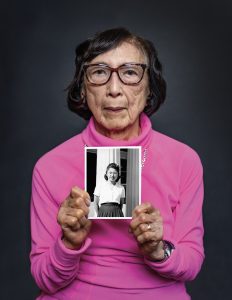Capturing Linfield’s disappearing history
Linfield Magazine Spring 2019
They grew up during the Depression and shouldered weighty responsibilities during World War II –on the battlefield and in their communities. Linfield College alumni from the 1940s saw their lives turned upside down in many ways, as the war raged and even in the years immediately after. Their stories vary. Mitsue (Endow) Salador ’45 was ordered to an internment camp. Bruce Stewart ’49 enrolled at a fast-changing Linfield after a stint in the U.S. Navy. Margaret (Parent) Lutz ’43 was inspired to join the naval reserves after seeing gold stars representing fallen classmates added to a flag in Melrose Hall. Linfield underwent dramatic change as well, with a drop in enrollment as students left for war and a surge in growth after GIs returned. Read their stories, offered here from interview transcripts, or hear these and other interviews in their own words.
Editor’s note: Linfield is developing an oral history archive of the varied experiences of Linfield alumni both at home and abroad during World War II. “The Linfield College Public History Project: World War II as Experience and Memory” was initiated by History Professors Rachel Schley and Lissa Wadewitz, as well as Archives Director Rich Schmidt. Student researchers Ruby Guyot ’19 and Elisia Harder ’20 are conducting interviews. If you or someone you know are willing to share a story, or if you have items from the era to donate to the archives, contact Schmidt at rschmidt@linfield.edu or 503-883-2734.
Forced to leave
 Mitsue (Endow) Salador ’45 was studying at Linfield to be a teacher in 1942 when she received a letter requiring her to report to the Portland Assembly Center. Her internment lasted three months, before she was released on the condition that she transfer and relocate 1,800 miles east to attend William Jewell College in Missouri. She was able to attend on the recommendation of William Smith, professor of sociology at Linfield. Ultimately, she earned master’s degrees in nursing (Western Reserve University) and teaching (New York University) and retired as a teacher in 1984. The Civil Liberties Act of 1988 provided a letter of apology from the president and monetary compensation to each Japanese-American survivor of the internment.
Mitsue (Endow) Salador ’45 was studying at Linfield to be a teacher in 1942 when she received a letter requiring her to report to the Portland Assembly Center. Her internment lasted three months, before she was released on the condition that she transfer and relocate 1,800 miles east to attend William Jewell College in Missouri. She was able to attend on the recommendation of William Smith, professor of sociology at Linfield. Ultimately, she earned master’s degrees in nursing (Western Reserve University) and teaching (New York University) and retired as a teacher in 1984. The Civil Liberties Act of 1988 provided a letter of apology from the president and monetary compensation to each Japanese-American survivor of the internment.
Dec. 7, 1941 was a Sunday and my best friend from high school came to visit that day and we both heard the news (of the Pearl Harbor attack) together. We picked up the newspaper and found that Japan was an enemy of the United States. I was horrified. It was a devastating blow. There was no change in the way my classmates related to me. I didn’t feel an ounce of discrimination. By May, the order came directly to each family that they had to move. Fortunately, a friend managed (my parents’ Hood River property) while my parents were to be gone. Soldiers came to the house to take them to the train station.
After they were on the trains, the shades were drawn so people would not know where they were going. They were on this train for a long time. When the train stopped and they were allowed to get out, they found they were in Pineville, California. Travel restrictions were imposed.
My Chinese friend was able to go by train or bus to her family but she had to wear a tag saying, ‘I am Chinese.’ I wasn’t able to join my parents. I was taken to the Portland Assembly Center with another Linfield freshman, and we were put into the women’s boarding room. It was a room that was formed with plywood walls in a livestock exposition building. We were in this big area and they had partitioned the area so there would be rooms for families and single women. There was no ceiling, just a high roof above us. We had to stand in line all day long. Laundry was done in mass facilities. All of the food was in mass. At that time, we just lived the best we could.
While I was in Portland I found out a person could be released from this confinement if they found a place outside the western defense command where someone would receive us and vouch for our safety. Dr. William Smith, my sociology professor, had taught at William Jewell College and could arrange for me to go there. He and I communicated by letter. I was given leave by the government that I could go on to William Jewel. I only spent the summer in a camp. I was able to get to Missouri in September when they admitted students.
There was such hysteria about the war. People genuinely feared that the battlefield would be on the Pacific coast. Thinking about it now, I don’t know how (internment) could’ve been prevented. But it was pretty devastating. I would be a different person if it weren’t for the war.
I feel very thankful having been at Linfield, because that made it possible for me to continue my life. When I think of Linfield, immediately I think of Dr. Smith. He was the personification of the kind of people I met at Linfield. Everyone was so friendly and nice. I felt comfortable being there.



